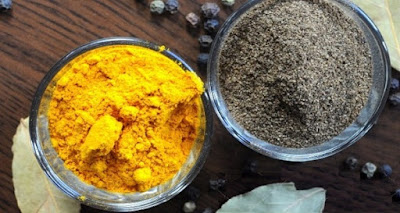Turmeric is one of the healthiest spices that exist. The plant is a relative of ginger and has been used in the ancient Ayurveda medicine for a long time. The main health benefits of turmeric are due to the presence of curcumin and curcuminoids, powerful compounds with healing properties. Although curcumin is beneficial for a variety of diseases including cancer, it has a pretty low absorption rate, meaning that it must be mixed with another ingredient that will increase its bioavailability. According to studies, even when used in high concentration, curcumin is present in only traces in the blood plasma, tissues and urine.
The Merck manual describes bioavailability as “the extent of and rate at which the active moiety (drug or metabolite) enters systemic circulation, thereby accessing the site of action.”
Scientific proof of turmeric’s low bioavailability
There have been a variety of studies on turmeric bioavailability. When to subjects orally, there were only traces of the spice in blood serum as the body metabolizes it before it enters the blood. In 1978, a study conducted by Blennow and Whalstron found out that turmeric is very poorly absorbed when taken orally. A later Indian study discovered that from 10 mg/kg. administered to the subjects orally, only 36 µg/ml. ended in the bloodstream.
One animal study showed that giving 400 mg. of turmeric to rats did almost nothing, with the spice being present in trace amounts in the liver and kidneys. After half an hour, 90% of the turmeric was present in the stomach and small intestine, and after 24 hours, there was only 1% of the turmeric in the tissues of the rats.
Here are 3 ways in which you can boost the bioavailability of turmeric:
Black pepper
According to Michael Greger, MD, “Piperine is a potent inhibitor of drug metabolism. One of the ways our liver gets rid of foreign substances is making them water-soluble so they can be more easily excreted. But this black pepper molecule inhibits that process.” Black pepper has powerful health benefits, but most importantly, it boosts the absorption rate of turmeric by 2000%!
“If people are given a bunch of turmeric curcumin, within an hour there’s a little bump in the level in their blood stream. We don’t see a large increase because our liver is actively trying to get rid of it. But what if the process is suppressed by taking just a quarter teaspoon’s worth of black pepper? Then you see curcumin levels skyrocket. The same amount of curcumin consumed, but the bioavailability shoots up 2000%. Even just a little pinch of pepper—1/20th of a teaspoon—can significantly boost levels. And guess what a common ingredient in curry powder is besides turmeric? Black pepper,” Dr. Greger says.
Healthy fats
Turmeric is a fat-soluble spice, meaning that it should be mixed with healthy fats in order to be effective. As Dr. Greger explains, pairing turmeric with a source of healthy fats such as avocado will allow the spice to enter the bloodstream through the lymphatic system by bypassing the liver.
Heat
Turmeric and its active ingredient curcumin are not easily absorbed in the body, but warming up the spice first helps. Experts recommend using turmeric in hot meals in order to boost its bioavailability and benefit from the spice properly.
